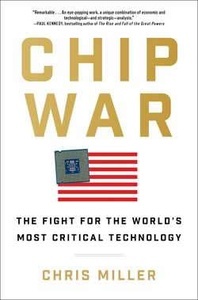Chip War

Editorial Simon x{0026} Schuster Ltd
Fecha de edición octubre 2022 · Edición nº 1
Idioma inglés
EAN 9781668012055
464 páginas
Libro
encuadernado en tapa blanda
Dimensiones 152 mm x 229 mm
Resumen del libro
An epic account of the decades-long battle to control what has emerged as the world's most critical resourcemicrochip technologywith the United States and China increasingly in conflict.
You may be surprised to learn that microchips are the new oilthe scarce resource on which the modern world depends. Today, military, economic, and geopolitical power are built on a foundation of computer chips. Virtually everythingfrom missiles to microwavesruns on chips, including cars, smartphones, the stock market, even the electric grid.
Until recently, America designed and built the fastest chips and maintained its lead as the 1 superpower, but America's edge is in danger of slipping, undermined by players in Taiwan, Korea, and Europe taking over manufacturing. Now, as Chip War reveals, China, which spends more on chips than any other product, is pouring billions into a chip-building initiative to catch up to the US. At stake is America's military superiority and economic prosperity.
Economic historian Chris Miller explains how the semiconductor came to play a critical role in modern life and how the U.S.
became dominant in chip design and manufacturing and applied this technology to military systems. America's victory in the Cold War and its global military dominance stems from its ability to harness computing power more effectively than any other power. But here, too, China is catching up, with its chip-building ambitions and military modernization going hand in hand.
America has let key components of the chip-building process slip out of its grasp, contributing not only to a worldwide chip shortage but also a new Cold War with a superpower adversary that is desperate to bridge the gap.
Illuminating, timely, and fascinating, Chip War shows that, to make sense of the current state of politics, economics, and technology, we must first understand the vital role played by chips.
Biografía del autor
Chris Miller es profesor de Historia Internacional en la Fletcher School de la Universidad de Tufts. Ejerce también de adjunto en el American Enterprise Institute y es director de investigación sobre Eurasia del Foreign Policy Research Institute. Aparece en canales como la CNBC o la NPR y escribe para publicaciones como Foreign Affairs y Foreign Policy. Tiene un doctorado y un máster por la Universidad de Yale y se licenció en Historia por la Universidad de Harvard. Es autor de We Shall Be Masters: Russian Pivots to East Asia from Peter the Great to Putin, The Struggle to Save the Soviet Economy: Mikhail Gorbachev and the Collapse of the USSR y Putinomics: Power and Money in Resurgent Russia.







